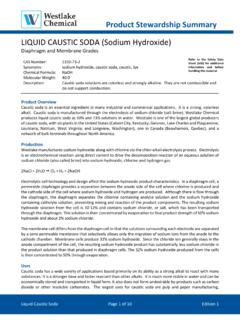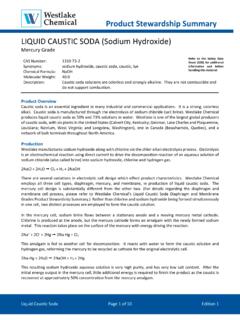Transcription of EPOLENE® Polymers - Westlake Chemical
1 High-gloss emulsion coatings for citrus fruits to maintain freshness and flavor of the fruit by reducing moisture loss and shrinkage. Coatings/laminations of paper for packaging materials used in manufacturing spiral-wound fiber drums. Components in hot melts for improved durability as compared with paint for marking highway surfaces. epolene Polymers Westlake Chemical Corporation offers a series of medium to low molecular weight polyethylene or polypropylene Polymers under the epolene Polymers trade name. They are useful in the plastics industry as lubricants for PVC, processing aids, mold release agents, dispersion aids, and coupling agents. They are also widely used as base Polymers for hot melt adhesives and pavement-striping compounds as well as petroleum wax modifiers for use in candles, investment casting, cable filling, and various paperboard coatings.
2 Numerous types of epolene Polymers are available, and properties can be selected to fit various processing operations. Many of these Polymers meet FDA food additive regulations for various indirect food contact applications. Primary Applications Candles Using 1%-5% epolene N-11, N-34, C-10, and C-15 Polymers is common to improve shrinkage, mold-release properties, gloss, sheen, opacity, and color dispersion in petroleum wax based candles. These additives are virtually odorless and smokeless when the correct wick size, candle shape, and additive concentration are used, plus with excellent melt and color stability, they can produce brighter, more reproducible colors when compared to stearic acid modified candles. epolene N-11 and N-34 Polymers are suggested when very low melt viscosities are preferred. Coatings epolene Polymers are useful as: Hot-melt or emulsion coatings on paper, providing high gloss and excellent barrier properties.
3 Temporary protective coatings for metal surfaces. Scuff-resistant emulsion coatings for glass bottles. Flatting agents for lacquers and enamel paints. Ingredients in sprayable herbicide and insecticide formulations for improved wetting and spreading characteristics. Hot Melt Adhesives epolene C-type Polymers are useful as base Polymers for hot-melt adhesives, producing bonds with low color, low density for high mileage, high char resistance, relatively high elevated temperature resistance, and excellent compatibility with various tackifying resins. Because of its relatively low viscosity and high softening point, epolene N-21 polymer can be useful as an additive for improving set speed. Inks Dispersions and emulsions of epolene Polymers are added to solvent and waterborne inks to improve resistance to rub-off, increase slip to the printed surface, and reduce offset.
4 The emulsions are compatible with many acrylic Polymers used in formulating inks for the water-based market. Paper As a lubricant for clay coatings applied to paper, epolene E-type Polymers tend to outperform many calcium stearate dispersions by providing increased lubricity during calendering. epolene polymer dispersions in clay coatings allow for higher processing speeds, less dusting, and higher gloss. Personal Care Products By improving elevated-temperature resistance, Chemical resistance, and inertness, epolene Polymers find use in a number of cosmetic and personal care products. Petroleum Wax Blends As a paraffin wax modifier in candles and crayons, epolene Polymers provide desirable gloss, sheen, opacity, and good mold release properties. Petroleum wax coating formulations can be modified with epolene Polymers to provide gloss retention, scuff resistance, improved hold-out and, in certain formulations, heat seal-ability.
5 Specific applications include coatings for corrugated kraft board, folding cartons, carbon paper, and a variety of other paper products. Plastic Additives As dispersion aids, epolene Polymers have unique wetting and dispersion characteristics for highly filled compositions and color concentrates. The maleic-anhydride modified epolene Polymers function as coupling agents for many filled or reinforced plastics to improve processability and surface characteristics. These functionalized Polymers are also useful as compatibilizers for various polymer alloy systems. epolene Polymers can be used as external lubricants for rigid and flexible PVC (polyvinyl chloride), including the extrusion of rigid PVC pipe for potable water. As a processing aid for linear low density polyethylene (LLDPE), epolene N-34 polymer has been found to increase the throughput of LLDPE with conventional extrusion equipment.
6 Polishes epolene E-type Polymers are used in a number of polish applications: Emulsions based on epolene E-type Polymers may be used in industrial or household liquid floor polishes to improve slip resistance, hardness, scuff resistance, durability, gloss, water resistance, leveling, buffability, and color. epolene E-type polymer emulsions can be added to vinyl car top polishes to improve luster or sheen and for long-lasting protection. Small additions of epolene E-type Polymers have been found to impart excellent gloss and film hardness in creamy automobile polishes, which are used in a single application to clean and wax weathered automobile finishes. epolene E-type Polymers are used in spray-and-wipe furniture polishes as typically applied using manual, pump-type dispensers to impart excellent luster and serve as a good dusting aid.
7 Processing Aids The addition of small amounts of epolene Polymers can substantially improve the processability of many plastics. Rubber As a processing aid for nitrile, butyl, SBR, EPDM, and neoprene rubber, epolene Polymers improve mixing of recipe ingredients, help reduce shrinkage, and reduce tackiness during processing. Textiles Emulsions based on epolene E-type Polymers are effective as softeners and lubricants for natural and synthetic fibers, improving abrasion resistance, tear resistance, and hand and sewing lubricity. Physical Properties Additive Dispersion Low melt viscosity and good compatibility with a variety of materials enable epolene Polymers to improve the dispersion properties of pigments, fillers, and other additives in a variety of plastics and rubber formulations. Antiblocking Action epolene Polymers are added to a variety of coating formulations to prevent parts that are coated with the formula from sticking together.
8 Barrier Properties Based on polyolefins, epolene Polymers are resistant to water, grease, and many chemicals. They can be used in hot melts, aqueous emulsions and/or as solution/solvent dispersions. Color Most epolene Polymers have very low color (Gardner color scale values in the 1 to 2 range). Compatibility epolene Polymers are compatible with many Polymers , resins, and natural and synthetic waxes. Hardness Penetration hardness values for epolene Polymers range from to tenths of a mm at 25 C. epolene Polymers tend to retain more hardness at elevated temperatures than most natural and paraffin waxes. Lubricity Because of their low coefficient of friction and range of compatibility, epolene Polymers are often added to formulated or compounded materials to improve surface lubricity, slip, and release properties.
9 epolene E-type Polymers are frequently used as external lubricants in the extrusion of rigid PVC for such applications as pipe, siding, and profiles. epolene C-type and N-type Polymers can be used as external lubricants for flexible PVC. epolene C-type and N-type Polymers can be used as lubricants for high density polyethylene as well. Melt Viscosity epolene Polymers are available in a broad selection of low, medium, and high viscosities. Each product is manufactured with a narrow viscosity range. Moisture and Grease Resistance epolene Polymers are insoluble in water, which results in high moisture resistance. They are also quite resistant to grease and many other chemicals. Softening Point epolene Polymers are available with a wide range of softening points ranging from 100 to 163 C. Solubility epolene Polymers tend to have limited solubility in solvents and oils at room temperature, but at elevated temperatures, they are soluble to varying degrees.
10 Using cloud point, it has been found that the epolene E-type Polymers tend to be more soluble in aliphatic solvents than the epolene C-type and N-type Polymers , with the epolene C-type Polymers tend to be more soluble than the epolene N-type Polymers . Furthermore, the lower density products tend to be more soluble than the higher density products, and the lower molecular weight products tend to be more soluble than the higher molecular weight products. Solubility tends to be best in nonpolar solvents such as toluene, xylene, mineral spirits, and naphtha. They tend to be insoluble in such solvents as n-butyl alcohol, n-propyl acetate, and ethyl alcohol. Surface Appearance The addition of epolene Polymers to formulated or compounded plastics can improve gloss and surface appearance of finished products. Toughness epolene Polymers are tougher than most natural and many synthetic waxes.











